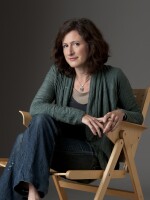
Neda Ulaby
Neda Ulaby reports on arts, entertainment, and cultural trends for NPR's Arts Desk.
Scouring the various and often overlapping worlds of art, music, television, film, new media and literature, Ulaby's radio and online stories reflect political and economic realities, cultural issues, obsessions and transitions, as well as artistic adventurousness— and awesomeness.
Over the last few years, Ulaby has strengthened NPR's television coverage both in terms of programming and industry coverage and profiled breakout artists such as Ellen Page and Skylar Grey and behind-the-scenes tastemakers ranging from super producer Timbaland to James Schamus, CEO of Focus Features. Her stories have included a series on women record producers, an investigation into exhibitions of plastinated human bodies, and a look at the legacy of gay activist Harvey Milk. Her profiles have brought listeners into the worlds of such performers as Tyler Perry, Ryan Seacrest, Mark Ruffalo, and Courtney Love.
Ulaby has earned multiple fellowships at the Getty Arts Journalism Program at USC Annenberg as well as a fellowship at the Knight Center for Specialized Journalism to study youth culture. In addition, Ulaby's weekly podcast of NPR's best arts stories. Culturetopia, won a Gracie award from the Alliance for Women in Media Foundation.
Joining NPR in 2000, Ulaby was recruited through NPR's Next Generation Radio, and landed a temporary position on the cultural desk as an editorial assistant. She started reporting regularly, augmenting her work with arts coverage for D.C.'s Washington City Paper.
Before coming to NPR, Ulaby worked as managing editor of Chicago's Windy City Times and co-hosted a local radio program, What's Coming Out at the Movies. Her film reviews and academic articles have been published across the country and internationally. For a time, she edited fiction for The Chicago Review and served on the editing staff of the leading academic journal Critical Inquiry. Ulaby taught classes in the humanities at the University of Chicago, Northeastern Illinois University and at high schools serving at-risk students.
A former doctoral student in English literature, Ulaby worked as an intern for the features desk of the Topeka Capital-Journal after graduating from Bryn Mawr College. She was born in Amman, Jordan, and grew up in the idyllic Midwestern college towns of Lawrence, Kansas and Ann Arbor, Michigan.
-
The new data show the drop in ticket sales at theaters, arts centers and orchestras in the United States, U.K. and Canada has been "catastrophic" for the performing arts.
-
It's not a normal Thanksgiving and holiday planning has gotten more complicated for many families and friends figuring out safe, socially distant ways to share favorite foods and treasured recipes.
-
This year feels like a horror movie, and a select group of filmmakers have taken the pandemic as inspiration. "Quar-horror" ranges from homemade shorts on YouTube to a movie filmed entirely on Zoom.
-
In a survey of more than 750 museum directors, 33% of them said there was either a "significant risk" of closing permanently by next fall or that they didn't know if their institutions would survive.
-
Nearly a thousand arts organizations across the country are receiving funds from the CARES Act. But the National Endowment for the Arts says the $44 million in grants it announced today is not enough.
-
With their emphasis on interactive exhibits, children's museums must balance safety and survival in their decisions to reopen. Several have permanently closed since the onset of the pandemic.
-
When the Roosevelt administration rolled out millions of dollars to fund artists, musicians, writers and actors, it wasn't just about job creation. It was to unite a nation in turmoil.
-
A leading U.S. arts organization released a survey of more than 10,000 artists and creative workers on Friday. It found 95% of them have experienced income loss as a result of COVID-19.
-
Computerized voices read newspaper stories from the 1918 flu pandemic in this haunting audio project. "I wanted it to sound like a broadcast from a dystopian future," says artist Jordan Baseman.
-
A new study shows that while there's so much uncertainty in the world, people prefer to return to old favorite books, movies and TV for comfort, rather than trying something new.







